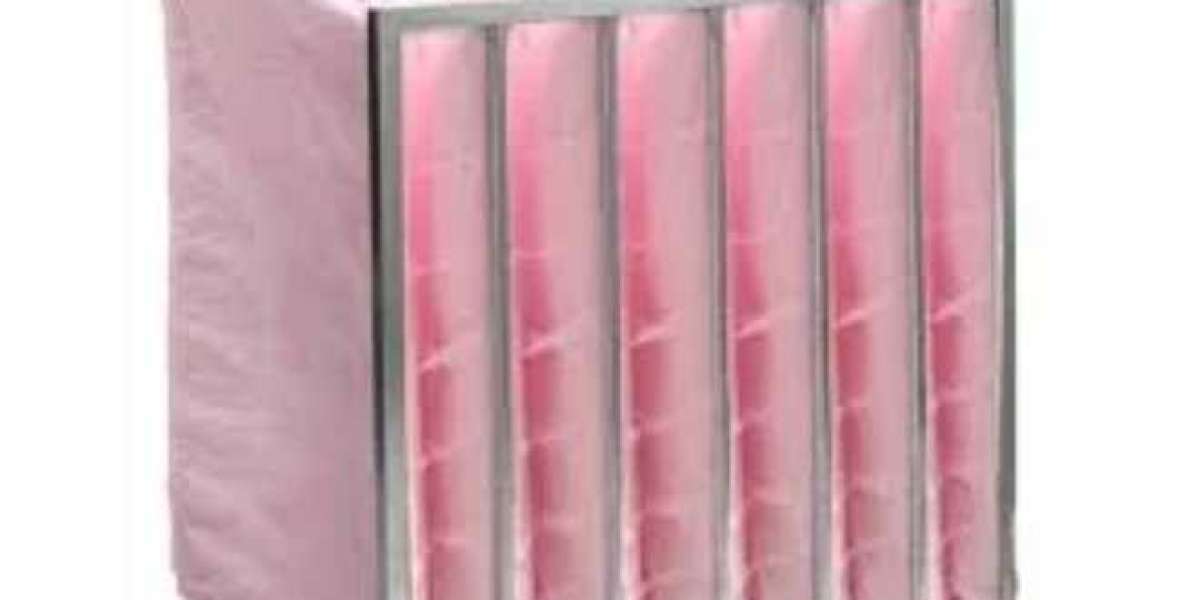Indoor air quality is a crucial aspect of our overall well-being, yet it often goes unnoticed and neglected. We spend a significant amount of time indoors, whether it's at home, work, or school, and the air we breathe can have a profound impact on our health. One effective way to improve indoor air quality is by using medium pocket filters. In this blog, we will explore what medium pocket filters are, how they work, and the benefits they offer in enhancing the air we breathe.
What are Medium Pocket Filters?
Medium pocket filters, also known as bag filters, are a type of air filter commonly used in HVAC (Heating, Ventilation, and Air Conditioning) systems. These filters are designed to capture and remove airborne particles, such as dust, pollen, mold spores, pet dander, and other contaminants, from the air circulating within a building. They are called "pocket filters" due to their unique construction, which consists of multiple pockets or bags made of synthetic or fiberglass media.

How do Medium Pocket Filters Work?
Medium pocket filters work on the principle of mechanical filtration. As air passes through the HVAC system, it is forced through the pockets of the filter. The filter media captures and retains particles of various sizes, preventing them from recirculating into the indoor air. The efficiency of a medium pocket filter is determined by its Minimum Efficiency Reporting Value (MERV) rating. The higher the MERV rating, the more efficient the filter is at capturing smaller particles.
Benefits of Medium Pocket Filters
1. Improved Indoor Air Quality
The primary benefit of using medium pocket filters is the significant improvement in indoor air quality. By capturing and removing airborne particles, these filters help reduce the presence of allergens and irritants in the air. This is particularly beneficial for individuals with respiratory conditions, such as asthma or allergies, as it can alleviate symptoms and improve overall respiratory health.
2. Reduced Health Risks
Poor indoor air quality can lead to various health issues, including respiratory problems, allergies, and even long-term complications. Medium pocket filters help mitigate these risks by removing harmful particles from the air. By reducing exposure to allergens and irritants, these filters contribute to a healthier indoor environment, minimizing the chances of developing respiratory ailments or exacerbating existing conditions.
3. Enhanced HVAC System Performance
Medium pocket filters not only improve indoor air quality but also contribute to the overall performance and longevity of HVAC systems. By preventing the accumulation of dust and debris on system components, these filters help maintain optimal airflow and prevent clogging. This, in turn, reduces strain on the system, lowers energy consumption, and extends the lifespan of HVAC equipment.
4. Cost Savings
Using medium pocket filters can lead to cost savings in multiple ways. Firstly, by reducing the strain on HVAC systems, these filters help improve energy efficiency, resulting in lower utility bills. Secondly, by preventing the buildup of dust and debris, they reduce the need for frequent system maintenance and repairs. Lastly, by improving indoor air quality and reducing health risks, medium pocket filters can potentially lower healthcare costs associated with respiratory illnesses.

Choosing the Right Medium Pocket Filter
When selecting a medium pocket filter for your HVAC system, it is essential to consider factors such as the MERV rating, filter size, and filter media. The MERV rating should be chosen based on the specific needs of your indoor environment. Higher MERV ratings provide better filtration but may require more frequent filter replacements due to increased resistance. The filter size should match the dimensions of your HVAC system, ensuring a proper fit. Additionally, consider the filter media, as synthetic media tends to be more efficient and durable compared to fiberglass.
Maintenance and Replacement
To ensure optimal performance, medium pocket filters require regular maintenance and replacement. The frequency of filter changes depends on various factors, including the MERV rating, the level of airborne contaminants, and the manufacturer's recommendations. It is crucial to follow a maintenance schedule and replace filters as needed to maintain clean and healthy indoor air.

Conclusion
Medium pocket filters play a vital role in improving indoor air quality by capturing and removing airborne particles. Their ability to enhance air quality, reduce health risks, improve HVAC system performance, and provide cost savings makes them an essential component of any indoor environment. By choosing the right filter and adhering to a maintenance schedule, you can ensure that the air you breathe is clean, healthy, and free from harmful contaminants. Prioritizing indoor air quality is an investment in your well-being and the well-being of those around you.
Understanding the Importance of Dust Collection Filters in Industrial Settings







